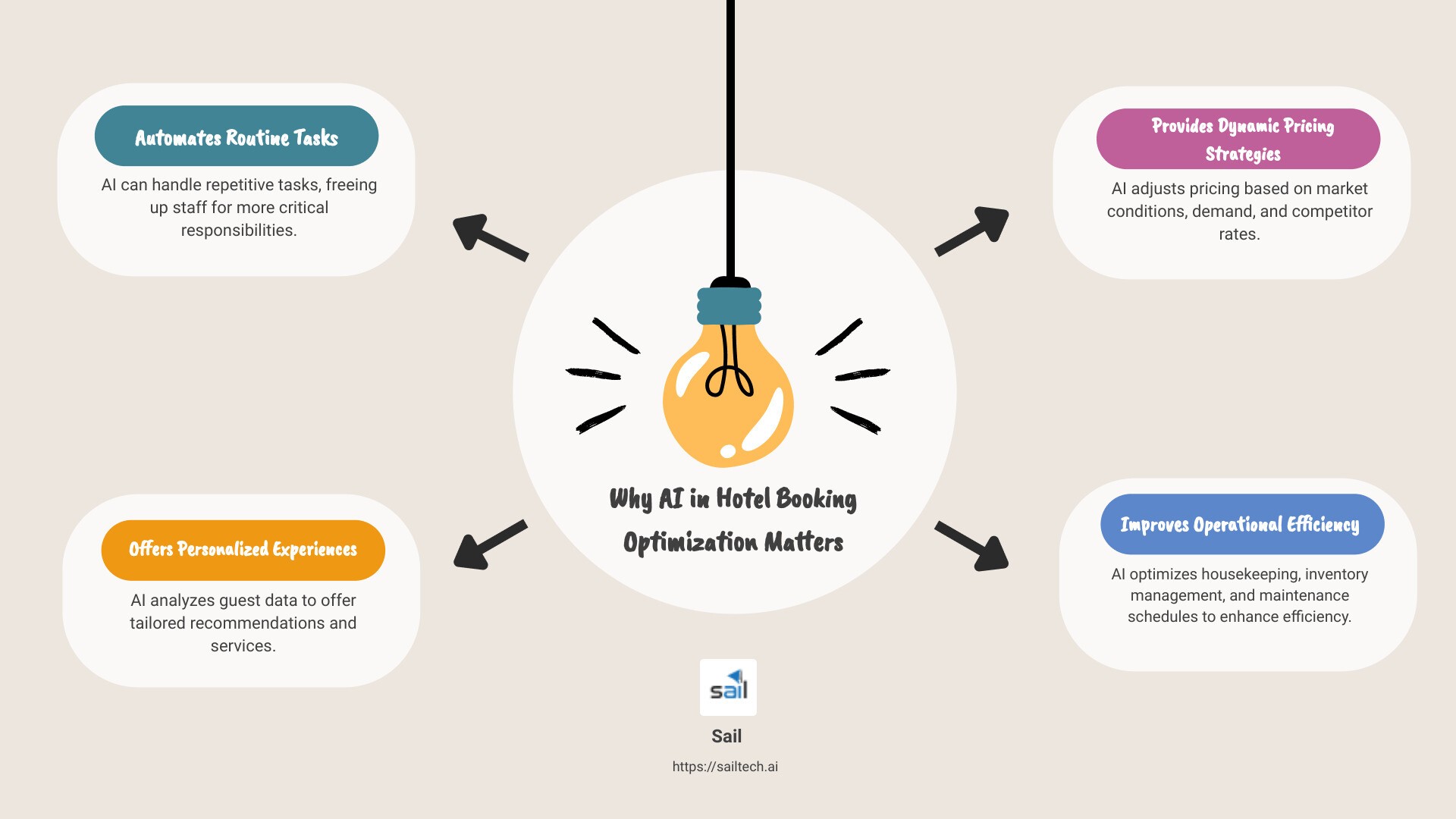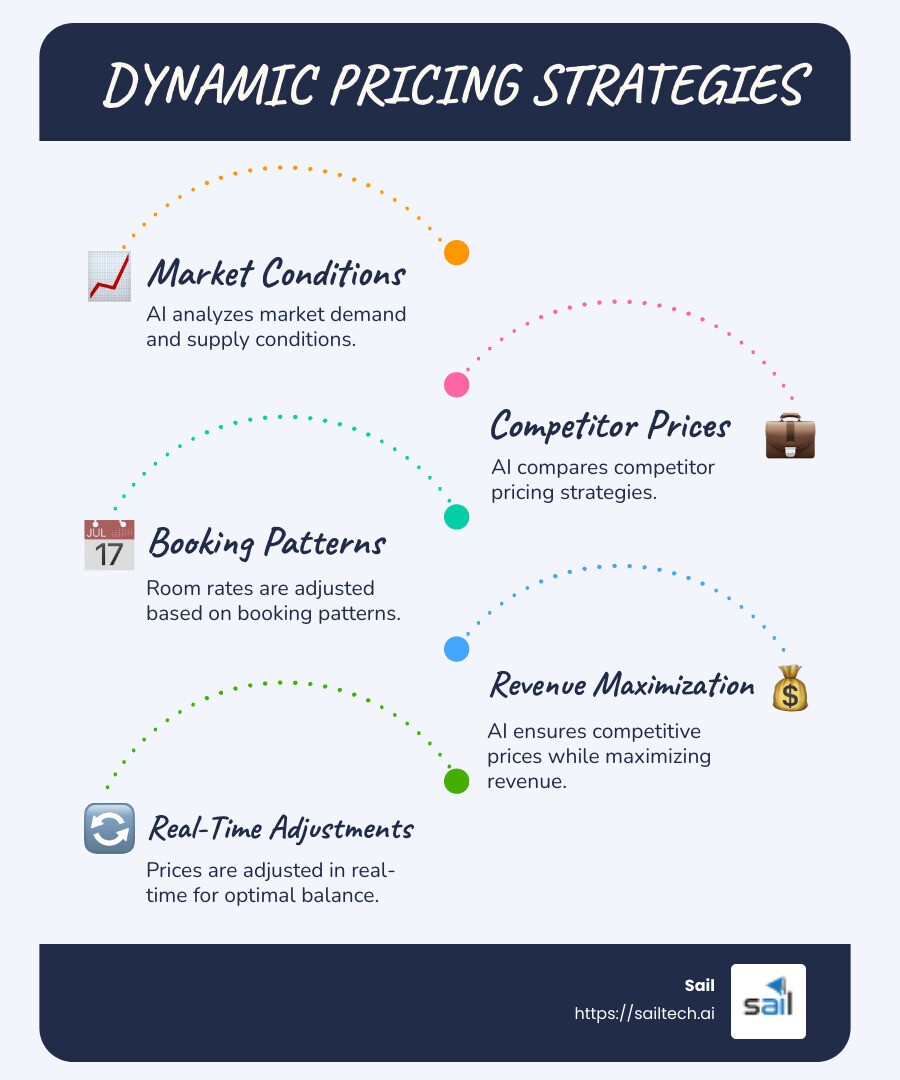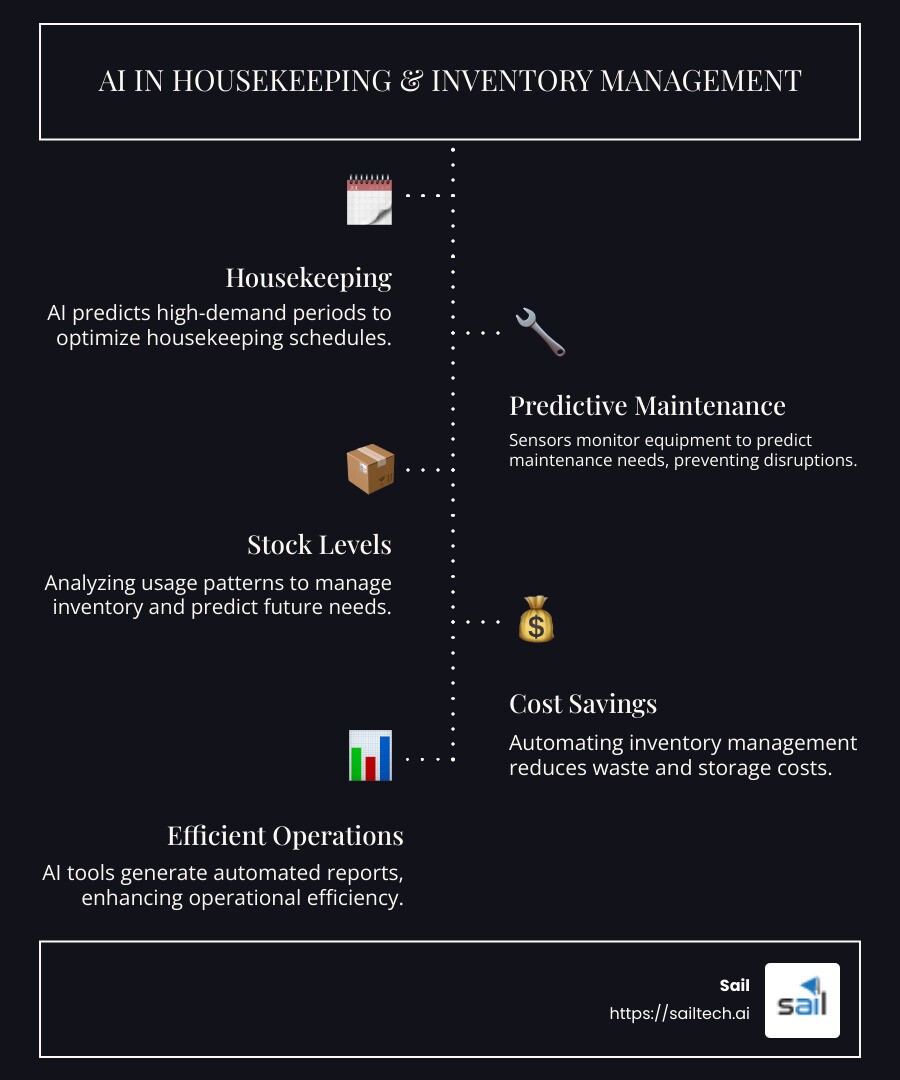Blogs /
AI & Technology
As travel demand evolves, hotel marketing is no longer just about visibility—it’s about being discovered where booking decisions are made. This report explores how search, social, and AI are reshaping guest acquisition.
Why AI in Hotel Booking Optimization Matters
AI in hotel booking optimization is revolutionizing the hospitality industry, offering substantial benefits to hotel operators and their guests. From streamlining operations to delivering personalized experiences, AI provides new avenues for enhancing guest satisfaction and increasing revenue.
Here’s how:
Automates routine tasks.
Offers personalized guest experiences.
Provides dynamic pricing strategies.
Improves operational efficiency.
Improves marketing efforts and revenue management.
In today's world, AI enables hotels to stay competitive by meeting guests' changing expectations. For instance, AI-driven chatbots and smart rooms create seamless, customized stays. This technology also shifts the load from staff, making operations more efficient and less error-prone.
I'm Shahar Rubin, founder of Sail. With my background in technology and hotel marketing, I have seen how AI-driven solutions transform hotel booking optimization.

The Role of AI in Hotel Booking Optimization
Dynamic Pricing Strategies
Dynamic pricing is a game-changer for hotels. AI algorithms analyze various factors like market conditions, competitor prices, and booking patterns to adjust room rates in real-time. This means you can offer competitive prices without compromising on revenue.
For example, AI tools can help hotels determine the right price for their rooms. They maximize total revenue per available room by leveraging data and adjusting prices based on demand and other variables.

Predictive Analytics for Demand Forecasting
Predictive analytics is another powerful tool in AI-powered booking. It helps hotels forecast demand by analyzing customer behavior, market trends, and historical data. This allows for smarter inventory management and better pricing strategies.
AI-driven models can analyze hotel booking data to optimize booking engines, catering to guest needs, ensuring a seamless booking experience, and increasing direct bookings.
Real-Time Adjustments
AI enables hotels to make real-time adjustments to their operations. Whether it's changing room rates based on sudden market shifts or reallocating resources to meet unexpected demand, AI helps hotels stay agile.
For instance, AI solutions can dynamically adjust room rates based on demand, ensuring greater profitability. This real-time capability is crucial for staying competitive and maximizing revenue.
By leveraging AI in hotel booking optimization, hotels can improve guest satisfaction, streamline operations, and boost revenue. The future of hospitality is here, and it’s powered by AI.
Enhancing Guest Experience with AI
AI-Powered Personalization
AI is changing how hotels deliver personalized experiences to their guests. From the moment of booking, AI can tailor the entire stay based on guest preferences and past behavior.
For example, some hotels have experimented with AI-powered assistants in rooms. These assistants allow guests to control room settings like lighting, temperature, and entertainment through voice commands. This not only adds convenience but also makes each stay unique by adapting to individual preferences.
Hotels can also send pre-arrival emails or SMS messages inviting guests to customize their stay further. Guests can choose pillow types, set room temperature preferences, or select drinks and snacks for their room. This level of customization ensures a memorable and comfortable stay.
AI-powered concierges can provide information about hotel amenities, dining recommendations, and local attractions. This personalized service improves guest satisfaction and engagement.
AI Chatbots and Virtual Assistants
AI chatbots and virtual assistants are revolutionizing guest interactions by providing instant responses to inquiries and automating simple tasks.
Some hotels use AI chatbots that guests can text for anything from restaurant reservations to quick tips about the city. This instant, 24/7 service greatly improves the guest experience by providing quick and accurate information.
AI chatbots are also used on hotel websites and social media platforms to handle guest inquiries before booking. These chatbots assist guests with questions ranging from room amenities to requests for extra pillows. This improves the overall service experience and speeds up the booking process.
In-room AI assistants give guests control over their environment through voice commands. These assistants can adjust room settings, play music, and even provide weather updates. This level of automation adds a layer of convenience and luxury to the guest experience.
In conclusion, AI-powered personalization and AI chatbots are key to enhancing guest experiences in hotels. By leveraging these technologies, hotels can offer customized services, instant responses, and a seamless stay, ensuring guests feel valued and satisfied.
Operational Efficiency through AI
AI in Housekeeping and Maintenance
AI is revolutionizing housekeeping and maintenance in hotels, making operations smoother and more efficient.
Housekeeping Optimization: AI can analyze guest booking patterns and predict high-demand periods. This helps in creating optimized schedules for housekeeping staff, ensuring that rooms are cleaned and ready in a timely manner. For instance, during school holidays, AI might predict an influx of families, prompting more frequent room turnovers and early morning cleanings. This ensures that staff is neither overworked nor idle, maintaining a balance that improves both efficiency and service quality.
Predictive Maintenance: AI can monitor the condition of hotel equipment and predict when maintenance is needed before issues arise. For example, sensors in HVAC systems can alert maintenance teams to potential failures, allowing for repairs before guests are affected. This not only prevents service disruptions but also extends the lifespan of equipment, saving costs in the long run.
Inventory and Resource Management
Stock Levels: AI helps manage inventory by analyzing usage patterns and predicting future needs. For large hotels, this means keeping optimal stock levels of linens, minibar items, and other consumables. AI can forecast increased demand during peak seasons or special events, ensuring the hotel is well-prepared without overstocking. For smaller hotels, a slight overstocking of essentials like linens and towels might be prudent to ensure quality service, blending AI insights with the expertise of seasoned staff.
Cost Savings: Automating inventory management reduces waste and storage costs. By ensuring that only necessary items are stocked, hotels can save on both purchasing and storage expenses. This efficiency translates to significant cost savings, particularly for large establishments where the scale of operations can make manual management cumbersome.
Efficient Operations: AI tools can generate automated reports and analytics, freeing management from mundane tasks and improving accuracy. This allows hoteliers to focus on strategic decision-making rather than getting bogged down in data compilation. With real-time insights, management can quickly identify trends, flag issues, and make adjustments to optimize operations.

Incorporating AI into housekeeping, maintenance, and inventory management not only improves operational efficiency but also improves guest satisfaction. By ensuring that rooms are always ready, equipment is functioning smoothly, and essential items are always in stock, hotels can provide a seamless and enjoyable experience for their guests.
Next, we'll explore how AI can drive marketing and revenue management, further enhancing the hotel's profitability and guest engagement.
AI in Marketing and Revenue Management
AI-Driven Marketing Campaigns
AI is changing how hotels approach marketing, making campaigns more effective and personalized.
Targeted Ads: AI can analyze vast amounts of customer data to create highly targeted ads. For instance, if a guest frequently searches for spa services, AI can tailor ads promoting spa packages directly to them. This increases the likelihood of bookings and ensures marketing budgets are spent efficiently.
Personalized Marketing: Personalization is key to engaging guests. AI can customize marketing messages based on individual preferences. For example, a couple who previously booked a romantic getaway might receive personalized offers for anniversary packages. This kind of custom marketing resonates more with guests, driving higher engagement and conversions.
Customer Data Analysis: AI excels at analyzing customer behavior and preferences. By examining past booking data, social media interactions, and even feedback, AI can identify trends and create detailed guest profiles. This helps hotels understand their guests better and tailor their services accordingly.
Direct Bookings: AI-powered marketing strategies can significantly boost direct bookings. By targeting potential guests with personalized ads and offers, hotels can drive traffic to their own websites rather than third-party booking platforms. This not only increases revenue but also allows hotels to build direct relationships with their guests.
Revenue Management Tools
AI is also revolutionizing revenue management, helping hotels maximize their profits through smarter pricing and demand forecasting.
Dynamic Pricing: AI algorithms can adjust room rates in real-time based on market conditions, competitor prices, and demand. For instance, during a local festival, AI can increase room rates to match the higher demand. Conversely, it can lower prices during off-peak periods to attract more bookings. This ensures hotels remain competitive and maximize revenue.
Demand Forecasting: AI can predict future demand by analyzing historical data, market trends, and even weather patterns. For example, if an upcoming concert is expected to draw large crowds, AI can forecast increased room bookings and adjust pricing accordingly. Accurate demand forecasting helps hotels plan better and avoid overbooking or underbooking.
Profit Maximization: By combining dynamic pricing and demand forecasting, AI helps hotels maximize their profits. For instance, AI can identify opportunities for upselling, such as offering room upgrades or additional services during high-demand periods. This not only boosts revenue but also improves the guest experience.
Incorporating AI into marketing and revenue management allows hotels to operate more efficiently and profitably. By leveraging AI-driven strategies, hotels can attract more guests, optimize pricing, and ultimately improve their bottom line.
Future Trends in AI for Hotels
Virtual Reality Tours
Virtual reality (VR) tours are becoming increasingly popular in the hotel industry. Hotels can now offer immersive experiences that allow potential guests to explore the property before booking.
Imagine walking through the lobby, checking out the pool, or viewing different room types—all from the comfort of your home. This not only improves guest engagement but also helps in making informed booking decisions. Guests can have a clear idea of what to expect, reducing the chances of disappointment and increasing booking confidence.
Predictive Room Service
Another exciting trend is predictive room service. By analyzing guest behavior and past preferences, AI can predict when a guest might want room service.
For example, if a guest often orders breakfast at 8 AM, the system can pre-emptively ask if they would like to place an order around that time. This leads to improved satisfaction as guests enjoy a seamless and personalized experience.
AI-Powered Sustainability Initiatives
Sustainability is a growing concern, and AI can play a crucial role in this area. AI-powered sustainability initiatives can help hotels manage their resources more efficiently.
Energy management systems can optimize electricity usage by adjusting lighting and HVAC systems based on occupancy. Similarly, water usage can be monitored and controlled to prevent waste. These initiatives not only contribute to sustainability efforts but also result in significant resource optimization and cost savings.
Integrating AI in these ways allows hotels to offer innovative, personalized, and sustainable experiences, setting new standards in the hospitality industry.
Frequently Asked Questions about AI in Hotel Booking Optimization
How does AI optimize hotel booking processes?
AI optimizes hotel booking processes by automating and streamlining various tasks. Here are a few ways:
Dynamic Pricing: AI algorithms adjust room rates in real-time based on demand, market conditions, and competitor prices. This ensures hotels maximize revenue while offering competitive rates to guests.
Personalized Recommendations: By analyzing guest data, AI can suggest personalized room options and services, increasing the likelihood of bookings.
Efficient Bookings: AI-powered systems can handle bookings and cancellations swiftly, reducing manual errors and saving time for both guests and staff.
Instant Responses: AI chatbots provide instant answers to guest inquiries, making the booking process smoother and more efficient.
What are the benefits of using AI in hotel revenue management?
Using AI in hotel revenue management offers several key benefits:
Accurate Demand Forecasting: AI analyzes historical data and current trends to predict future demand. This helps in planning and optimizing room availability.
Optimized Pricing: AI tools can dynamically adjust prices to match demand, ensuring rooms are always priced competitively. This can lead to increased revenue and occupancy rates.
Improved Marketing: AI helps in creating targeted marketing campaigns. By analyzing customer data, it can deliver personalized ads that attract more direct bookings.
Resource Allocation: AI can predict peak times and allocate resources efficiently, ensuring that the hotel operates smoothly even during busy periods.
How can AI improve guest experiences in hotels?
AI significantly improves guest experiences in several ways:
Personalized Interactions: AI can tailor experiences based on guest preferences. For example, it can suggest activities, restaurants, or services that align with a guest's interests.
AI Chatbots and Virtual Assistants: These tools provide instant responses to guest inquiries, handle simple requests like wake-up calls, and offer information about hotel services. This leads to faster service and higher guest satisfaction.
Predictive Room Service: By analyzing guest behavior, AI can anticipate needs and offer services proactively, such as suggesting breakfast orders at the usual time a guest prefers.
In-Room AI Assistants: Devices like voice-activated assistants can control room settings, answer questions, and provide concierge services, making the stay more comfortable and enjoyable.
By integrating AI, hotels can offer a more personalized, efficient, and satisfying experience for their guests, ultimately leading to higher satisfaction and loyalty.
Conclusion
AI is changing the hotel industry in remarkable ways. From optimizing bookings to enhancing guest experiences, the benefits are clear.
Operational Efficiency: AI streamlines operations by automating repetitive tasks. This allows hotel staff to focus on more strategic, guest-centric activities. For example, AI-driven chatbots handle routine inquiries, freeing up staff for more complex tasks. Predictive maintenance ensures that hotel facilities are always in top shape, minimizing downtime and enhancing guest satisfaction.
Guest Satisfaction: Personalized experiences are at the heart of AI's impact. By analyzing guest data, AI can offer custom recommendations, from dining options to local attractions. This level of personalization makes guests feel valued and understood, boosting their overall satisfaction. AI-powered smart rooms adjust settings like temperature and lighting based on guest preferences, creating a comfortable and welcoming environment.
Revenue Management: AI helps hotels implement dynamic pricing strategies that adjust room rates based on real-time demand and market conditions. This ensures maximum revenue per available room. AI also aids in demand forecasting, allowing hotels to optimize room availability and pricing strategies effectively.
Future Trends: The future of AI in hotels looks promising. Virtual reality tours can offer potential guests an immersive experience before booking. Predictive room service can anticipate guest needs, enhancing convenience and satisfaction. AI-powered sustainability initiatives can optimize energy and resource use, contributing to environmental efforts.
Incorporating AI into hotel operations is not just about keeping up with trends; it's about setting new standards in hospitality. By leveraging AI, hotels can offer exceptional service, streamline operations, and significantly boost revenue.
Ready to transform your hotel with AI? Explore how Sail can help you achieve unprecedented success.
By embracing AI, we can lift guest experiences, optimize operations, and drive revenue growth. The future of hospitality is here, and it's powered by AI.
Share:
20 years of hospitality lessons. No fluff. No spam
Join 500+ hospitality pros getting our best growth playbooks.
© 2026 Sail. All rights reserved.

